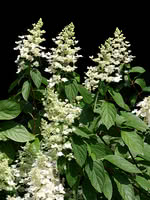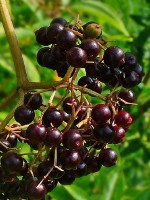Mon-Fri 9am - 5pm Mountain time
Phantom Hydrangea vs Ranch Elderberry
Hydrangea paniculata Phantom
Sambucus canadensis Ranch
CUSTOM GROW
NOT AVAILABLE THIS SEASON - MIGHT RETURN
Phantom Hydrangea is a striking deciduous shrub with impressive blooms. It is multi-stemmed and produces pale green flowers that fade to white and soft pink as they mature. These flower clusters can reach up to 15” (40cm) long and while other shrubs will droop from the flowers' weight, Phantom Hydrangea has sturdy stems that support them.
This adaptable shrub will make a beautiful addition to your yard as a flowering hedge or as an ornamental plant on its own. Try pruning the flowers after they are spent to get even larger flower heads.
Ranch Elderberry is a vigorous and high-yielding Black Elderberry cultivar. It ripens earlier than other varieties and is smaller and more compact making berry harvest easier. The berries are well-suited for baked goods, jams, jellies, and syrups. They are high in vitamin C and reported to be beneficial for the immune system.
Black Elderberries are considered to be partially self-pollinating. So while they will still produce some berries without cross-pollination, planting with another variety will increase yields. Consider planting with Black Elderberry or Bob Gordon Elderberry.
Warning: the seeds, stems, leaves, roots, and uncooked berries are toxic to humans when eaten in quantity. Berries should be cooked to make them safe for human consumption.
Phantom Hydrangea Quick Facts
Ranch Elderberry Quick Facts
Toxicity: leaves, stems, and uncooked berries are poisonous to humans

